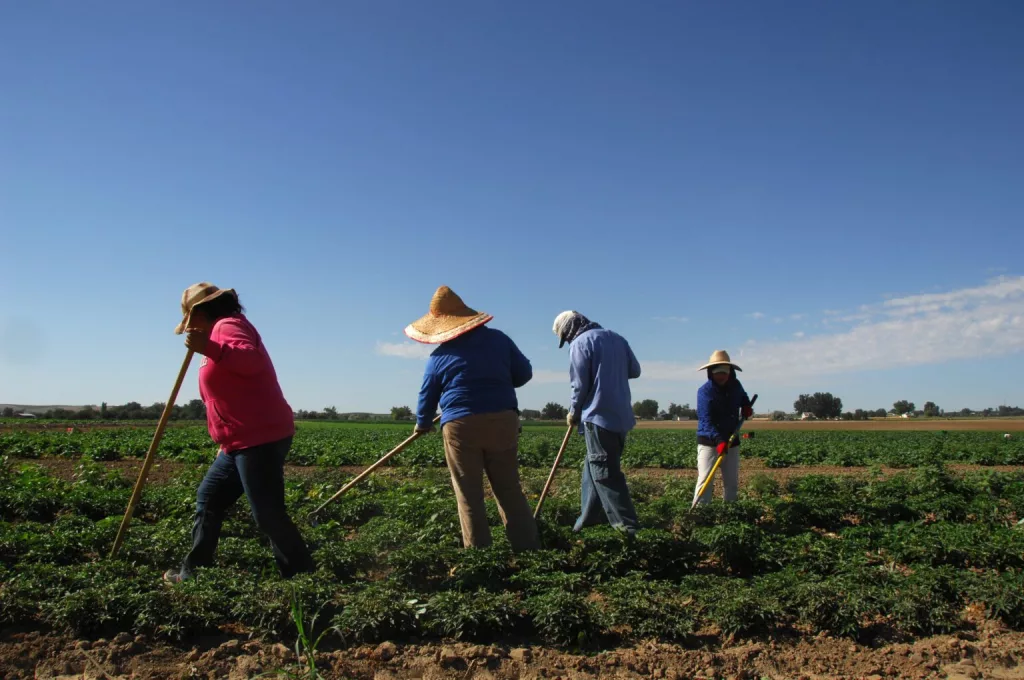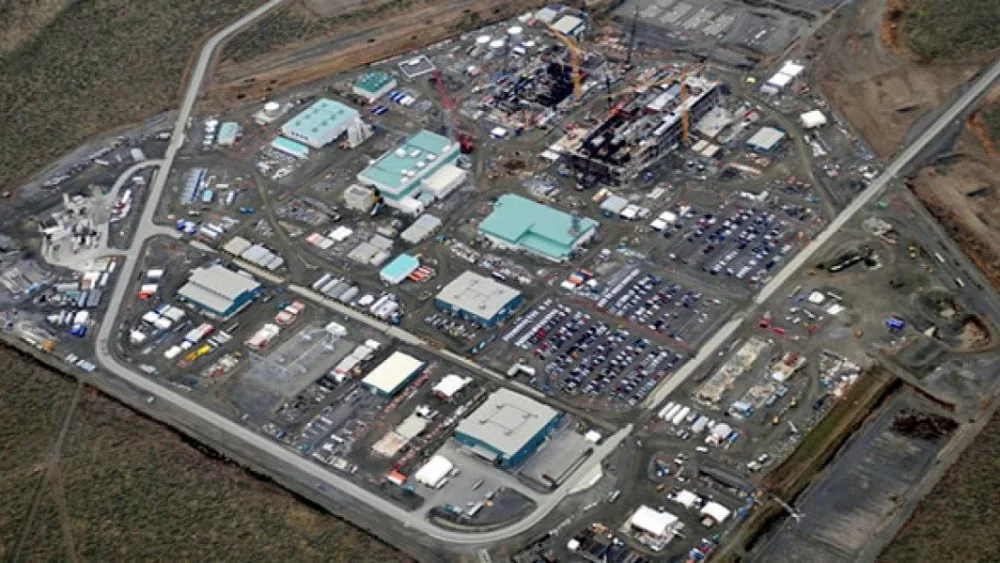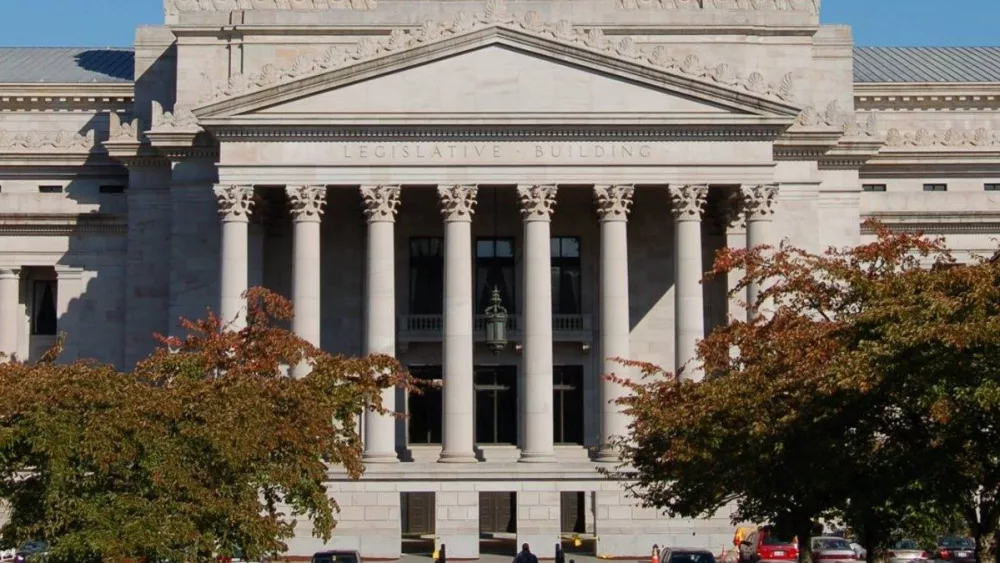This story was originally published by InvestigateWest on Jan. 23.
Republican Congressman Mike Simpson hopes that one day Idaho can surpass Wisconsin as the No. 2 dairy-producing state in the nation.
But he doesn’t think it can get there without the labor of thousands of undocumented workers now facing the prospect of deportation from President Donald Trump’s administration and efforts from Idaho lawmakers to block their employment.
Since 2019, he has proposed legislation three times in Congress to provide a pathway to citizenship for such workers — and each time the bills failed after critics in his own party characterized them as amnesty for unauthorized immigrants who were taking jobs from American workers.
“These are not jobs that Americans will take,” Simpson, who represents Idaho’s 2nd Congressional District, told InvestigateWest. “And frankly, I don’t know how much you’re willing to pay for a gallon of milk, but if you lost all the dairy workers in Idaho and throughout the country, the price of milk products would go through the roof.”
As a new administration focused on border politics takes over, Simpson stands on one side of the divide between proposals that seek to deport thousands of undocumented people and the economic realities in Idaho, which depends on migrant labor for much of its economy. At the statehouse in Boise, lawmakers are expected to consider a proposal that highlights that tension: a requirement that employers use a federal verification system that confirms workers’ immigration status and revokes the business licenses of employers who hire undocumented employees.
The system, known as E-Verify, has drawn support from those calling for a border crackdown, but it has a spotty record in states where it has been adopted, proving ineffective at catching unauthorized workers and showing little impact on the undocumented population, according to population data. Dairy farmers and agricultural organizations have opposed the program, saying it puts an unfair burden on employers and threatens one of the state’s most important industries.
“Really what you’re doing in that instance is putting more onus on employers, when this should be something that should be handled at the border,” said Rick Naerebout, the executive director of the Idaho Dairymen’s Association, in a news conference at the Idaho Capitol in 2024.
Naerebout has worked alongside Simpson on efforts to provide a path to legal status for agricultural workers, but this year he plans to mostly play defense in the Idaho Legislature as many lawmakers are already working on bills aimed at curbing illegal immigration.
Studies have shown that at least 50% of the U.S. dairy workforce is undocumented. A mandatory E-Verify law could cost those workers, and dairy farmers, their jobs in Idaho.
Idaho lawmakers see mandatory E-Verify as a tangible way they can address the “border crisis” on a state level.
“I think we all believe that if you’re going to be working in Idaho, you need to be here legally,” said Rep. Jordan Redman, R-Coeur d’Alene, who proposed the E-Verify bill last year and told InvestigateWest that he is working on a second attempt for the current session.
But data shows states with mandatory E-Verify have seen little change in the population of undocumented workers and that even 16 years after passing its law, Arizona still doesn’t have 100% cooperation from employers.
“The effect on the illegal immigrant population is pretty small,” said Alex Nowrasteh, vice president of economic and social policy studies for the Cato Institute, a libertarian think tank. “The effect on raising the cost for businesses is just one more headache that they have to deal with. So there’s really no good purpose to doing it. In fact, the best argument for E-Verify is that it doesn’t really work that well so it allows politicians to talk tough about illegal immigration without imposing a big cost on the economy.”
‘Business death penalty’
E-Verify was created in 1996 by the Department of Homeland Security to allow businesses to determine the eligibility of their employees to work in the United States. Arizona was the first state to enact mandatory E-Verify for all employers in 2008, telling employers who violated the law that they would lose their business license. At the time, business owners and civil rights groups termed it “the business death penalty.”
Since then, a handful of states have adopted laws mandating E-Verify, including Florida and South Carolina in 2021.
In 2008, just 0.8% of employees in Arizona who were run through E-Verify were deemed unauthorized to work, according to data from U.S. Citizenship and Immigration Services obtained by the Cato Institute. Since then, the number of employees flagged through E-Verify dropped, with just 0.1% deemed unauthorized to work in 2016.
But Nowrasteh said undocumented workers make up much more of the workforce in Arizona than less than a percent. E-Verify just isn’t flagging people: A 2009 government audit of E-Verify found an inaccuracy rate of 54% when identifying unauthorized workers.
On top of that, many employers aren’t using it even when it’s required. As of 2016, 71% of employers in Arizona were using E-Verify.
Nowrasteh said that’s because there are few mechanisms in place to enforce the law.
Since 2008, just two businesses in Arizona have had licenses revoked for failing to use E-Verify, according to the Wall Street Journal.
Legislation was proposed to place stricter penalties on business owners who fail to use E-Verify, but it didn’t pass. The bill would have made violations a felony, assessing fines of $10,000 for each unauthorized worker that a business had.
But Nowrasteh said that might not have helped either.
“Good luck checking on E-Verify usage,” Nowrasteh said. “You’re going to have to do audits of business records to try to figure out exactly what businesses are doing with E-Verify.”
Arizona Rep. Ben Toma, who proposed the bill that would place stricter penalties on businesses that don’t use E-Verify, told a panel of fellow lawmakers last year, according to the Arizona Mirror, that the law encourages fairness for businesses that do use E-Verify. Other supporters in the Arizona statehouse said the law is a deterrent for illegal immigration and sends a message that Arizona is “not a sanctuary state.”
Arizona has seen a modest dip in undocumented immigrants since requiring E-Verify.
In 2008, Arizona had an estimated 350,000 undocumented immigrants; in 2009 the number dropped by 7%, and it has either remained stagnant or slowly declined in the years since, according to the Pew Research Center.
But other states with mandatory E-Verify laws have not seen the same decline as Arizona, according to Pew. Mississippi mandated E-Verify in 2011 and has seen little to no change in its undocumented population. North Carolina mandated E-Verify in 2013 and has also seen little change in the undocumented population. The same is true for Alabama and Georgia. Florida passed a mandatory E-verify law in 2021, and there isn’t data from Pew showing recent numbers of undocumented populations.
Some lawmakers think the legislation could be enough just to deter immigrants from seeking jobs in Idaho.
Rep. Mike Moyle, R-Star, and the speaker of the Idaho House, told InvestigateWest in a news conference at the Capitol earlier this month that E-Verify and other pieces of immigration-related legislation are about sending a message to undocumented immigrants.
“I think there’s some things we can adjust so that the message is sent,” he said. “‘Do it right and we’re OK with that, but if you do it wrong, there’s going to be consequences.’”
Idaho could lose dairies
Idaho ranks third in the nation for dairy production, behind Wisconsin and California. Idaho dairies employ over 33,000 workers, and around 90% of them are foreign born, according to the Idaho Dairymen’s Association.
While there are no exact figures indicating how many of those workers are undocumented, Idaho businesses, including dairy farmers, told researchers from the University of Idaho’s McClure Center for Public Policy Research that they do employ undocumented workers when they are not able to find authorized workers.
Much of Idaho’s agriculture industry relies on the H-2A labor program, which is a federal program that allows employers to bring in foreign labor for seasonal work and return to their home countries after the growing season. But dairy farmers are required to milk cows and tend to the dairy every day, all year-round.
Hernan Tejeda, an economist and researcher at the UI’s College of Agriculture and Life Sciences, said dairy work is incredibly difficult and few people want to do it, which is why dairy farmers often rely on undocumented workers.
“The wage rate (for dairy workers) is around $18 to $20 per hour, and anybody can just go to McDonald’s or be in construction and have a much easier life,” Tejeda said. “Why would they go and work in a dairy where it’s very laborious and you have to be there all day?”
Tejeda said to attract American workers, dairies may have to increase wages considerably.
“The profit margins are so slim that a sizable increase in wages would not be feasible and the business would be impossible to run,” he said.
E-Verify or mass deportations, which have been promised under the Trump administration and supported by Idaho Gov. Brad Little, could jeopardize the workforce that many industries, especially dairies, rely on.
Without an undocumented workforce, Philip Watson, an economist and researcher at the University of Idaho College of Agriculture and Life Sciences, said the state could lose over $900 million in gross domestic product.
Watson said state policies, like mandatory E-Verify, would put Idaho dairies at a disadvantage when it comes to being able to hire workers and produce milk at the rate Idahoans are used to.
“The industry has said that it would put it at a competitive disadvantage for having new dairies move in or existing dairies expand their operations,” Watson said. “There’s a point at which dairies would start leaving Idaho, if it was too costly to produce milk relative to some other state.”
Under current policy, employers in states that do not have mandatory E-Verify laws must complete an I-9 form for every employee, which requires the employer to examine an employee’s work authorization documentation, such as a passport, driver’s license, permanent resident card or other forms. But under the Immigrant Employee Rights Act, an employer cannot ask about an individual’s legal status.
Proponents of E-Verify say that using the program gives employers added protection that they do not have if they can’t ask about an employee’s legal status. They say using E-Verify could shield employers from the civil and criminal penalties of knowingly hiring someone who is unauthorized to work in the U.S.
Immigrants ‘important’ to Idaho economy
Redman said he is meeting with the Idaho Dairymen’s Association and Idaho Farm Bureau to try to work out a way to propose an E-Verify bill without jeopardizing their industries. But there seems to be little middle ground.
“We are all strong supporters of border security,” Naerebout said during last year’s legislative session. “That’s not in question. If we didn’t have an immigrant workforce that worked alongside our dairyman and farmers day in and day out, who are a loyal, dedicated family-oriented group of people and important to Idaho’s economy — we wouldn’t be where we are today.”
Moyle said he hopes the dairymen can come to an agreement with lawmakers, but he also said that if they don’t, “they’re going to get run over.”
“There’s a way to do E-Verify with the dairies,” he said. “Maybe staggering it in to give the federal government time to either react or for the dairies to find alternatives.”
But Simpson wants the Legislature to pump the brakes.
“I think it’s important that the Legislature hold off,” he said. “I understand what they’re trying to do and why they’re trying to do it, but there are secondary consequences that they need to be aware of.”
This story also appeared on Idaho Capital Sun.





